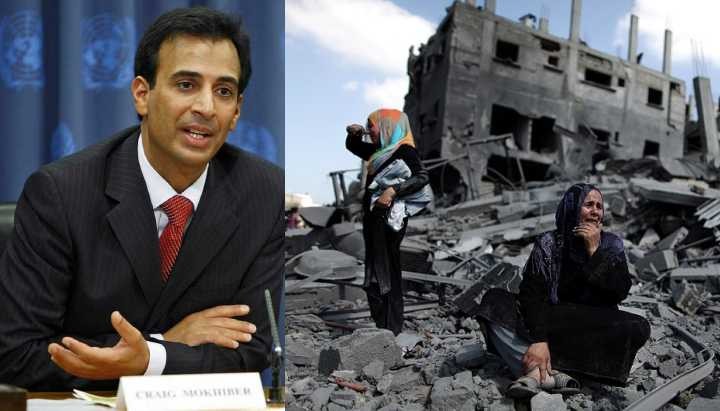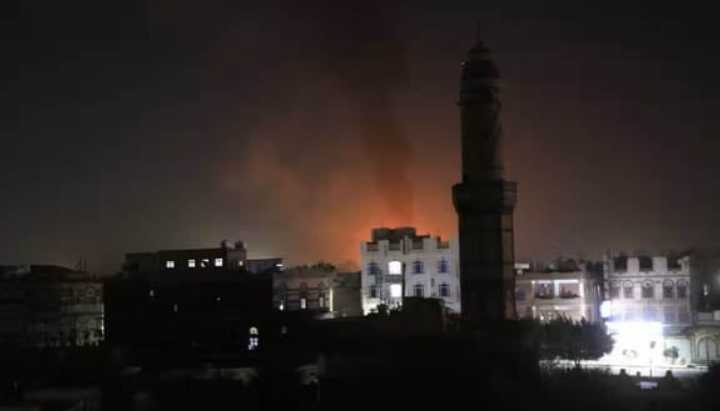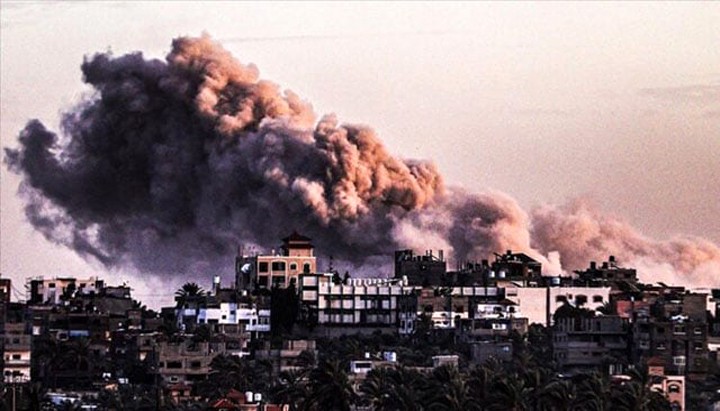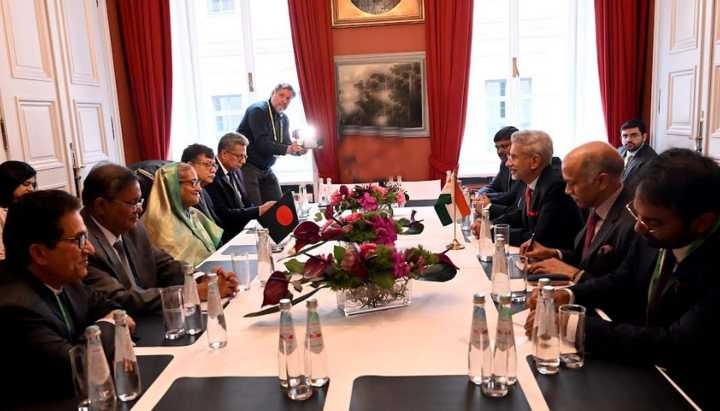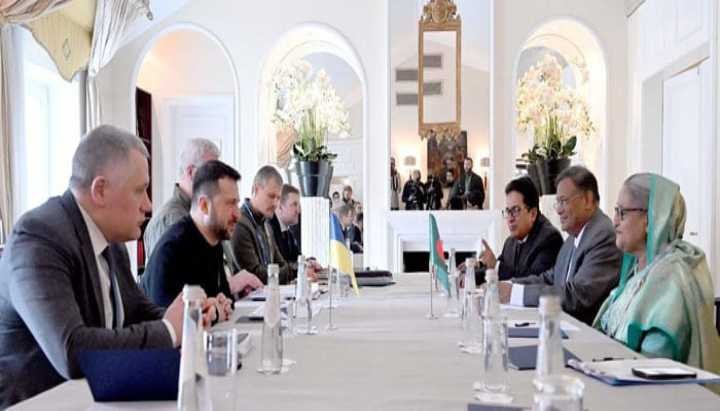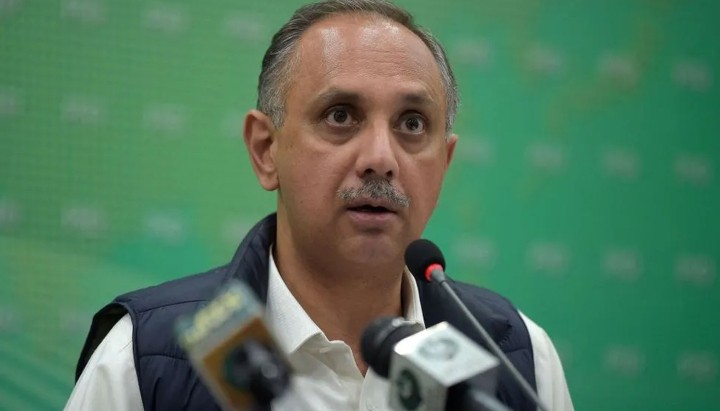In his final official communication to Volker Turk, the High
Commissioner for Human Rights at Palais Wilson, Geneva, Craig Mokhiber, the
Director of the New York Office of the High Commissioner for Human Rights, has
expressed deep concern over ongoing human rights violations in Gaza. Mokhiber,
a veteran human rights lawyer with over three decades of experience, laid out his
profound worries and outlined a ten-point plan to address the critical
situation.
In the letter, Mokhiber began by, ‘This will be my last
official communication to you as Director of the New York Office of the High
Commissioner for Human Rights.’
He wrote, ‘I write at a moment of great anguish for the
world, including for many of our colleagues. Once again, we are seeing a
genocide unfolding before our eyes, and the Organization that we serve appears
powerless to stop it. As someone who has investigated human rights in Palestine
since the 1980s, lived in Gaza as a UN human rights advisor in the 1990s, and
carried out several human rights missions to the country before and since, this
is deeply personal to me.’
Mokhiber drew parallels between the current situation in
Palestine and past genocides, including those against the Tutsis, Bosnian
Muslims, Yazidi, and Rohingya. He lamented the failure of the international
community, including the United Nations, to effectively prevent mass atrocities,
protect vulnerable populations, and hold perpetrators accountable. He argued
that successive waves of murder and persecution against the Palestinians have
occurred throughout the UN's existence.
Mokhiber strongly asserted that the ongoing situation in
Palestine constitutes a textbook case of genocide. He pointed to the European,
ethno-nationalist, settler colonial project in Palestine as entering its final
phase, aimed at the expedited destruction of the last remnants of indigenous
Palestinian life in Palestine. Furthermore, he criticized the complicity of the
United States, the United Kingdom, and much of Europe in supporting the Israeli
government's actions through arms sales, economic and intelligence support, and
diplomatic cover.
He also said, ‘In concert with this, western corporate
media, increasingly captured and state-adjacent, are in open breach of Article
20 of the ICCPR, continuously dehumanizing Palestinians to facilitate the
genocide, and broadcasting propaganda for war and advocacy of national, racial,
or religious hatred that constitutes incitement to discrimination, hostility,
and violence. US-based social media companies are suppressing the voices of
human rights defenders while amplifying pro-Israel propaganda. Israel lobby
online-trolls and GONGOS are harassing and smearing human rights defenders, and
western universities and employers are collaborating with them to punish those
who dare to speak out against the atrocities. In the wake of this genocide,
there must be an accounting for these actors as well, just as there was for
radio Milles Collines in Rwanda.’
‘In such circumstances, the demands on our organization for
principled and effective action are greater than ever. But we have not met the
challenge. The protective enforcement power Security Council has again been
blocked by US intransigence, the SG is under assault for the mildest of
protestations, and our human rights mechanisms are under sustained slanderous
attack by an organized, online impunity network.’
In the letter Mokhiber said, Decades of distraction by the
illusory and largely disingenuous promises of Oslo have diverted the
Organization from its core duty to defend international law, international
human rights, and the Charter itself. The mantra of the “two-state solution”
has become an open joke in the corridors of the UN, both for its utter
impossibility in fact, and for its total failure to account for the inalienable
human rights of the Palestinian people. The so-called “Quartet” has become
nothing more than a fig leaf for inaction and for subservience to a brutal
status quo. The (US-scripted) deference to “agreements between the parties
themselves” (in place of international law) was always a transparent
slight-of-hand, designed to reinforce the power of Israel over the rights of
the occupied and dispossessed Palestinians.
Mentioning the High Commissioner he said, I came to this
Organization first in the 1980s, because I found in it a principled, normbased
institution that was squarely on the side of human rights, including in cases
where the powerful US, UK, and Europe were not on our side. While my own
government, its subsidiarity institutions, and much of the US media were still
supporting or justifying South African apartheid, Israeli oppression, and
Central American death squads, the UN was standing up for the oppressed peoples
of those lands. We had international law on our side. We had human rights on
our side. We had principle on our side. Our authority was rooted in our
integrity. But no more.
‘In recent decades, key parts of the UN have surrendered to
the power of the US, and to fear of the Israel Lobby, to abandon these
principles, and to retreat from international law itself. We have lost a lot in
this abandonment, not least our own global credibility. But the Palestinian
people have sustained the biggest losses as a result of our failures. It is a
stunning historic irony that the Universal Declaration of Human Rights was
adopted in the same year that the Nakba was perpetrated against the Palestinian
people. As we commemorate the 75th Anniversary of the UDHR, we would do well to
abandon the old cliché that the UDHR was born out of the atrocities that
proceeded it, and to admit that it was born alongside one of the most atrocious
genocides of the 20th Century, that of the destruction of Palestine. In some
sense, the framers were promising human rights to everyone, except the
Palestinian people. And let us remember as well, that the UN itself carries the
original sin of helping to facilitate the dispossession of the Palestinian
people by ratifying the European settler colonial project that seized
Palestinian land and turned it over to the colonists. We have much for which to
atone.’
Mentioning that the path to atonement is clear he said, we
have much to learn from the principled stance taken in cities around the world
in recent days, as masses of people stand up against the genocide, even at risk
of beatings and arrest. Palestinians and their allies, human rights defenders
of every stripe, Christian and Muslim organizations, and progressive Jewish
voices saying “not in our name”, are all leading the way. All we have to do is
to follow them.
‘Yesterday, just a few blocks from here, New York’s Grand
Central Station was completely taken over by thousands of Jewish human rights
defenders standing in solidarity with the Palestinian people and demanding an
end to Israeli tyranny (many risking arrest, in the process). In doing so, they
stripped away in an instant the Israeli hasbara propaganda point (and old
antisemitic trope) that Israel somehow represents the Jewish people. It does
not. And, as such, Israel is solely responsible for its crimes. On this point,
it bears repeating, in spite of Israel lobby smears to the contrary, that
criticism of Israel’s human rights violations is not antisemitic, any more than
criticism of Saudi violations is Islamophobic, criticism of Myanmar violations
is anti-Buddhist, or criticism of Indian violations is anti-Hindu. When they
seek to silence us with smears, we must raise our voice, not lower it. I trust
you will agree, High Commissioner, that this is what speaking truth to power is
all about.’
‘But I also find hope in those parts of the UN that have
refused to compromise the Organization’s human rights principles in spite of
enormous pressures to do so. Our independent special rapporteurs, commissions
of enquiry, and treaty body experts, alongside most of our staff, have
continued to stand up for the human rights of the Palestinian people, even as
other parts of the UN (even at the highest levels) have shamefully bowed their
heads to power. As the custodians of the human rights norms and standards,
OHCHR has a particular duty to defend those standards. Our job, I believe, is
to make our voice heard, from the SecretaryGeneral to the newest UN recruit,
and horizontally across the wider UN system, insisting that the human rights of
the Palestinian people are not up for debate, negotiation, or compromise
anywhere under the blue flag.’
‘What, then, would a UN-norm-based position look like? For
what would we work if we were true to our rhetorical admonitions about human
rights and equality for all, accountability for perpetrators, redress for
victims, protection of the vulnerable, and empowerment for rights-holders, all
under the rule of law? The answer, I believe, is simple—if we have the clarity
to see beyond the propagandistic smokescreens that distort the vision of
justice to which we are sworn, the courage to abandon fear and deference to powerful
states, and the will to truly take up the banner of human rights and peace. To
be sure, this is a long-term project and a steep climb. But we must begin now
or surrender to unspeakable horror. I see ten essential points:
1. Legitimate action: First, we in the UN must abandon the
failed (and largely disingenuous) Oslo paradigm, its illusory two-state
solution, its impotent and complicit Quartet, and its subjugation of
international law to the dictates of presumed political expediency. Our
positions must be unapologetically based on international human rights and
international law.
2. Clarity of Vision: We must stop the pretense that this is
simply a conflict over land or religion between two warring parties and admit
the reality of the situation in which a disproportionately powerful state is
colonizing, persecuting, and dispossessing an indigenous population on the
basis of their ethnicity.
3. One State based on human rights: We must support the
establishment of a single, democratic, secular state in all of historic
Palestine, with equal rights for Christians, Muslims, and Jews, and, therefore,
the dismantling of the deeply racist, settler-colonial project and an end to
apartheid across the land.
4. Fighting Apartheid: We must redirect all UN efforts and
resources to the struggle against apartheid, just as we did for South Africa in
the 1970s, 80s, and early 90s.
5. Return and Compensation: We must reaffirm and insist on
the right to return and full compensation for all Palestinians and their
families currently living in the occupied territories, in Lebanon, Jordan,
Syria, and in the diaspora across the globe.
6. Truth and Justice: We must call for a transitional
justice process, making full use of decades of accumulated UN investigations,
enquiries, and reports, to document the truth, and to ensure accountability for
all perpetrators, redress for all victims, and remedies for documented
injustices.
7. Protection: We must press for the deployment of a
well-resourced and strongly mandated UN protection force with a sustained
mandate to protect civilians from the river to the sea.
8. Disarmament: We must advocate for the removal and
destruction of Israel’s massive stockpiles of nuclear, chemical, and biological
weapons, lest the conflict lead to the total destruction of the region and,
possibly, beyond.
9. Mediation: We must recognize that the US and other
western powers are in fact not credible mediators, but rather actual parties to
the conflict who are complicit with Israel in the violation of Palestinian
rights, and we must engage them as such.
10. Solidarity: We must open our doors (and the doors of the
SG) wide to the legions of Palestinian, Israeli, Jewish, Muslim, and Christian
human rights defenders who are standing in solidarity with the people of
Palestine and their human rights and stop the unconstrained flow of Israel
lobbyists to the offices of UN leaders, where they advocate for continued war,
persecution, apartheid, and impunity, and smear our human rights defenders for
their principled defense of Palestinian rights.’
He said that, ‘This will take years to achieve, and western
powers will fight us every step of the way, so we must be steadfast. In the
immediate term, we must work for an immediate ceasefire and an end to the
longstanding siege on Gaza, stand up against the ethnic cleansing of Gaza,
Jerusalem, and the West Bank (and elsewhere), document the genocidal assault in
Gaza, help to bring massive humanitarian aid and reconstruction to the
Palestinians, take care of our traumatized colleagues and their families, and
fight like hell for a principled approach in the UN’s political offices.’
‘The UN’s failure in Palestine thus far is not a reason for
us to withdraw. Rather it should give us the courage to abandon the failed
paradigm of the past, and fully embrace a more principled course. Let us, as
OHCHR, boldly and proudly join the anti-apartheid movement that is growing all
around the world, adding our logo to the banner of equality and human rights
for the Palestinian people. The world is watching. We will all be accountable
for where we stood at this crucial moment in history. Let us stand on the side
of justice.’
At the very last of the letter Mokhiber wrote, ‘I thank you,
High Commissioner, Volker, for hearing this final appeal from my desk. I will
leave the Office in a few days for the last time, after more than three decades
of service. But please do not hesitate to reach out if I can be of assistance
in the future.’


